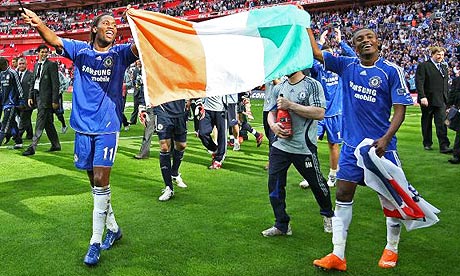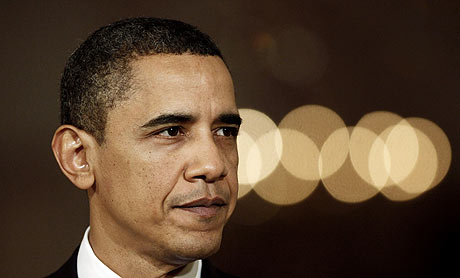Search
Recent Comments
- PG on Who Is Tony Karon?
- Rigidonv on The Mayhem of GOP Class Politics in 2016
- groovy clock on Rice-Olmert-Abbas: End of the Affair
- Russia’s fanning of anti-Israeli sentiment takes dark detour into Holocaust denialism on What Is Rootless Cosmopolitan?
- Russia’s fanning of anti-Israeli sentiment takes dark detour into Holocaust denialism - Quick Telecast on What Is Rootless Cosmopolitan?
Category Archives: Situation Report
Why Ahmadinejad (Hearts) NY

Anti-Ahmadinejad protestors in New York last time: The Iranian leader will hope to see the Israeli flag flying prominently among those denouncing him
The US secretary of state Hillary Clinton was clearly unsettled by the news that the president of Iran, Mahmoud Ahmadinejad, plans to show up in New York on Monday at the UN’s Non-Proliferation Treaty Review Conference.
As far as the US is concerned, Iran is a pariah in the international conversation about proliferation, and halting its alleged pursuit of nuclear weapons is one of Washington’s key objectives at the New York conference.
“If [Mr Ahmadinejad] believes that by coming he can somehow divert attention from this very important global effort or cause confusion that might possibly throw into doubt what Iran has been up to … then I don’t believe he will have a particularly receptive audience.” At least she hopes not.
Somewhere in Tehran, Mrs Clinton’s remarks will have prompted Mr Ahmadinejad to smile his pantomime villain’s smile. He’s going to New York because he believes he’ll have an opportunity to confound US objectives.
Sure, he’ll be the focus of much opprobrium – senators from Mrs Clinton’s own party tried to reverse her administration’s decision to grant him a visa, apparently ignorant of their country’s obligations as host to the United Nations. And there will be hundreds of demonstrators across from the UN headquarters, perhaps some waving Israeli flags. At least, Mr Ahmadinejad hopes so, because he too intends to make an issue of Israel – not by threatening to wipe it out, but by pointing that Israel possesses a nuclear arsenal capable of wiping out Iran 20 times over, and yet doesn’t feature in Washington’s non-proliferation agenda.
So while the US hopes to use Iran’s failure to fully comply with the transparency requirements of the treaty to raise support for new sanctions against Tehran, the Iranians plan to draw attention to western double standards in applying the NPT. Continue reading
Posted in Situation Report
Tagged Ahmadinejad, Clinton, Iran, Israel, NPT, nuclear, Obama
15 Comments
Who ‘We’ Are When the Whistle Blows

Chelsea’s Drogba and Kalou fly the Ivoirian flag. But Kalou was very nearly a Dutchman…
The fleet-footed Chelsea forward Solomon Kalou might permit himself a wry smile as he stands at attention for L’Abidjanaise, the national anthem of the Ivory Coast, when Les Elephantes face Portugal in their World Cup opener on June 15.
Were it not for the stubbornness of former Netherlands immigration minister Rita Verdonk, Kalou would have turned up at the World Cup in the other orange shirt – as a Dutchman. By turning down attempts by the Netherlands football authorities to fast-track citizenship for Kalou in time to pick him for the 2006 World Cup, the conservative Verdonk actually spared his parents a major headache: the Dutch that year played a group game against an Ivory Coast squad that included Solomon’s older brother, Bonaventure.
But the episode is simply a reminder that international football often demonstrates just how fluid and fungible the notion of nationality can be. In the same 2006 World Cup, when Croatia played Australia, three players in the Croatian squad were actually Australian, while seven of the Socceroos were eligible to represent Croatia. Continue reading
Posted in Glancing Headers, Situation Report
Tagged 2010, Brazil, Croatia, Drogba, Football, identity, Kalou, nation, national, Soccer, South Africa, World Cup
19 Comments
The World Cup as War by Other Means

‘Just don’t mention the war” was the cardinal rule when hosting German guests at Fawlty Towers, the eponymous hotel in the ’70s British TV sitcom. But it has never applied to England football fans: whenever their team plays Germany, they taunt the opposition with a ditty (to the tune of The Camptown Races) with the lyrics: Two world wars and one world cup, dooh-dah, dooh-dah …
The English are hardly alone in linking football and war. When Holland beat Germany in a Euro ’88 semifinal, literally 60% of the Dutch population took to the streets to celebrate, many of them chanting “Hurrah, we got our bikes back!” That was a far larger crowd than the one which celebrated Holland’s victory over the Soviet Union in the final of the same tournament days later, but the bicycle reference said it all: Dutch people had had their bikes confiscated when the Nazis invaded the Netherlands 48 years earlier. Those who fell/rose cheering from their graves, wrote Dutch poet Jules Deelder, while a veteran of the underground resistance enthused: “It feels as though we’ve won the war at last.”
Payback for wartime humiliation was also the Argentine narrative for Diego Maradona’s notorious “hand of God” goal against England at the 1986 World Cup (and the “goal of the century” he added later in the game). Sure, Maradona used his fist to prod the ball over Peter Shilton for the opening goal, but for a country still smarting from the wounds of the Falklands/Malvinas War four years earlier, England had to be beaten by any means necessary. As Maradona said afterwards: “We knew they had killed a lot of Argentine boys (in the Malvinas), killed them like little birds. And this was revenge.” Sure, Maradona had cheated, but so had the British, in Argentine minds, by sinking an Argentine warship outside the zone of exclusion around the islands, killing some 323 sailors. Jorge Valdano, who was on the field that day, knew Maradona had cheated, but said “at that moment we only felt joy, relief, perhaps a forced sense of justice. It was England, let’s not forget, and the Malvinas were fresh in the memory.” Continue reading
Posted in Glancing Headers, Situation Report
Tagged Football, Maradona, Soccer, war, World Cup
10 Comments
Why Karzai Won’t Do as He’s Told

To some it may seem as if President Hamid Karzai has a death wish. The Afghan leader has lately begun sticking it to the U.S. and its Western allies — the only force protecting him from a surging Taliban, which hanged the last foreign-backed President when it reached Kabul in 1996. But Karzai is doing it not just because he can get away with it, knowing he’s the only game in town for Washington, but also because he must if he’s to survive in the Afghan political environment once the U.S. leaves. Continue reading
Obama Reproduces Bush’s Iran Failure

Iran diplomacy in Washington these days consists principally of coaxing the likes of Russia and China to support new sanctions – and persuading gullible journalists that Moscow and Beijing are “on board”.
On Friday, the US president Barack Obama told CBS television that Iran is trying to get the “capacity to develop nuclear weapons”, and that he and his allies “are going to ratchet up the pressure … with a unified international community”. Nobody sets much store by such talk, of course, because President George W Bush had been saying the same thing since 2006 with little effect. Continue reading
Posted in Situation Report
14 Comments
Truth and Consequences in the Middle East

My latest on Tomdispatch:
Israel Won’t Change Unless the Status Quo Has a Downside
Obama’s peace plan is doomed because failure costs Israel nothing
Uncomfortable at the spectacle of the Obama administration in an open confrontation with the Israeli government, Connecticut Senator Joe Lieberman — who represents the interests of Prime Minister Benjamin Netanyahu’s Likud Party on Capitol Hill as faithfully as he does those of the health insurance industry — called for a halt. “Let’s cut the family fighting, the family feud,” he said. “It’s unnecessary; it’s destructive of our shared national interest. It’s time to lower voices, to get over the family feud between the U.S. and Israel. It just doesn’t serve anybody’s interests but our enemies.”
The idea that the U.S. and Israel are “family” with identical national interests is a convenient fiction that Lieberman and his fellow Israel partisans have worked relentlessly to promote — and enforce — in Washington over the past two decades. If the bonds are indeed familial, however, last week’s showdown between Washington and the Netanyahu government may be counted as one of those feuds in which truths are uttered in the heat of the moment that call into question the fundamental terms of the relationship. Such truths are never easily swept under the rug once the dispute is settled. The immediate rupture, that is, precludes a simple return to the status quo ante; instead, a renegotiation of the terms of the relationship somehow ends up on the agenda.
Continue reading
Israel’s Apartheid Without Consequences

Those who live behind its walls are still ruled by the Israeli state
The former US president Jimmy Carter set off a firestorm in 2006 when he said that Israel would have to choose between maintaining an apartheid occupation of the West Bank and Gaza and a two-state peace agreement with the Palestinians. That Mr Carter brokered Israel’s most important peace treaty with an Arab country was immaterial; he was branded an enemy of Israel, an anti-Semite and even a Holocaust-denier.
Israel’s friends in the US reacted out of instinct, knowing that an association with apartheid – South Africa’s erstwhile system of racial oppression – would bring international condemnation and isolation. But there was no word of protest from that quarter last week when Israel’s defence minister said what Mr Carter had. “If, and as long as between the Jordan (River) and the (Mediterranean) Sea there is only one political entity, named Israel, it will end up being either non-Jewish or non-democratic,” warned Ehud Barak, speaking at Israel’s annual Herzliya security conference. “If the Palestinians vote in elections it is a binational state and if they don’t vote it is an apartheid state.”
Which, of course, is exactly what Mr Carter was arguing…
…It should come as little surprise that Israelis are cool towards Mr Obama’s peace effort: Israel’s cost-benefit analysis weighs against pursuing a peace agreement that carries risk. There are no consequences for maintaining the status quo. Unless Mr Obama and others can change that cost-benefit analysis, they’re wasting their time.
Continue reading
Posted in Situation Report
28 Comments
Bracing for Israel’s Next Gaza Attack

There were no winners in the Gaza war that Israel launched a year ago today, but no shortage of losers. And failure to address its underlying causes – the economic siege through which Israel, Egypt and the US hope to force Hamas from power, and that organisation’s ability to respond by firing rockets into Israel – means that far from anyone learning the lessons of the brutal folly that was Operation Cast Lead, a repeat may be imminent. Continue reading
Posted in Situation Report
23 Comments
How I Overcame My Jewish-Evangelical Upbringing and Learned to Love Christmas, Anyway

Guest Column: Gavin Evans Back in the day, when Gavin and I were young activists trying to change the world, the doorbell rang at our Observatory student house. I opened it to see a tall and handsome man in the silky purple shirt and dog collar of an Anglican Bishop. “You must be Tony,” said Bishop Bruce Evans. “I hope you’re going to make a mensch out of my son.” I was a little gobsmacked to hear +Bruce, as I came to know him, tossing out yiddish bon mots. But as his menschedik son relates here, many are the pathways of the lord, and all that….
The fundamentalist century
By Gavin Evans
So, Christmas and Hannukah have rolled past again, following in the wake of Eid and Diwali. Lots of celebrations all around and, perhaps, time to put a bit of religion back into the mix.
It is fitting to start with the obvious point that these festivals and commemorations are not all they seem. Take Christmas: the date of December 25 was chosen by the Romans sometime after 350 AD, probably to coincide with a pagan festival (and certainly not the birth date of the historical Jesus) – one of the many ways the Romans managed to wed Christianity with pre-existing Pagan traditions and beliefs. But Christmas only became prominent after Charlemagne was crowned on December 25, 800, and it took more than another millennium before the traditions of trees, and presents crept in (Queen Victoria and Charles Dickens did their bit) – and a bit longer before the North Pole Santa arrived. In other words, its connections with Christianity are tenuous, to say the least. It has become, essentially, a secular celebration – which is one of the reasons why I am happy to embrace its charms.
But this was not the way I grew up. I was raised on fundamentalism, and Christmas certainly wasn’t exempt. We were told the point wasn’t the actual date but rather that this was celebration of the birth of Jesus and that we give presents to remember that God gave his son for our salvation (I later discovered that other cultures – Spanish, for example – give their presents later as a celebration of the gifts given by the Three Wise Men). Continue reading
Posted in Guest Columns, Situation Report
25 Comments
Why Obama Defaulted to Bush on Iran

This from my latest on TIME.com.
Having concluded that President Obama’s outreach has failed to halt Iran’s nuclear program, the final weeks of 2009 find his Administration focused on mustering support for new sanctions against the Islamic Republic. Iran’s rejection of the terms offered thus far by the U.S. and its partners has prompted Obama to largely revert to the Bush Administration’s approach of ultimatums backed by sanctions — with little obvious prospect of producing a substantially different result.
So how did he get here? In a nutshell, he allowed the Washington hawks, in concert with Israel and European hawks such as Sarkozy, to paint him into a corner by setting an artificial deadline on his diplomatic effort, and more importantly, basing them on the same demands as the Bush Administration which Iran had repeatedly rejected. Not only has Iran’s domestic turmoil limited its own regime’s room for maneuver, Iran’s opposition is as vehement as its conservatives in rejecting Washington’s demand that Iran give up uranium enrichment.
So Obama is going out on the road of further sanctions, now, but it’s generally agreed that sanctions aren’t going to change Iran’s position. At which point those who set the time-limits on diplomacy will demand that Obama go to war….
Continue reading
